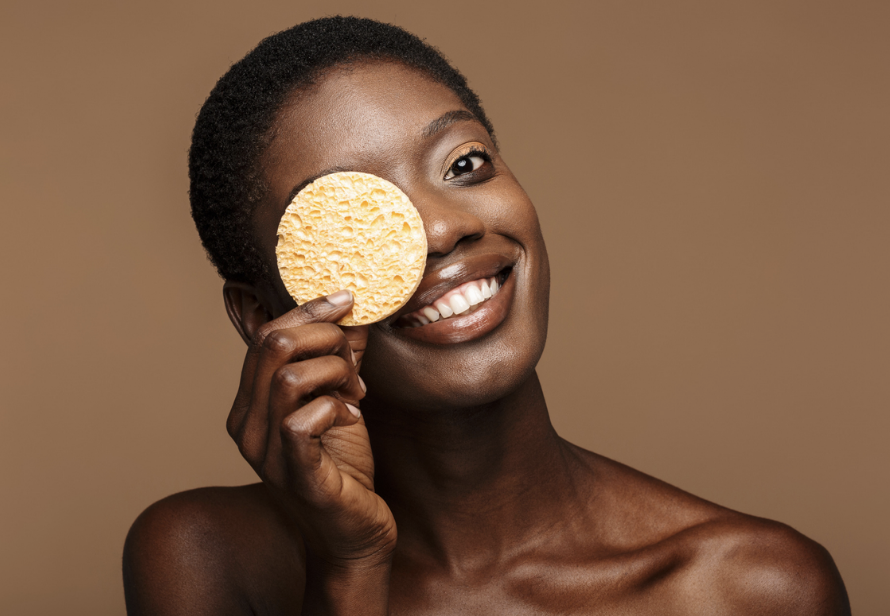Just because we’re all social distancing doesn’t mean that we should lower our standards when it comes to our daily beauty regime. We spoke to an expert dermatologist who gave us some top tips on how to achieve glowing skin.
In these troubled times, a sure-fire way to boost your wellbeing is establishing a beauty routine that you know will deliver and one area that we can take care of with a little bit of TLC is our skin.
There’s no better time to introduce a new skin care regime than now when many of us will be skipping our morning make-up rituals for an extra 20 minutes in bed before working from home. Using the next few weeks to embed a new routine makes real beauty sense. Once established, the payoff will be when you start to see the long-term benefits to our skin.
So, what are the steps to achieving glowing skin? We spoke to consultant dermatologist from sk:n clinics, Dr Daron Seukeran, to give us the lowdown.

Double cleanse and exfoliate
Even without wearing make-up your skin will still need a good clean in the evening after collecting dirt throughout the day:
If you’re still using a little make-up for those work video calls, first remove it by using a make-up remover such as micellar water or a cleansing balm.
The next step is to do a second cleanse to ensure a thorough clean. Double cleansing preps the skin and allows for better absorption of active ingredients in the next step of topical treatments. Use a gentle cleanser that won’t strip all the natural oils off your skin. Oily skin types may want to use a foaming face wash and those with dry skin may want to use a cream or lotion type cleanser so as to not cause too much irritation to the skin.
I recommend exfoliating once or twice a week for a deeper clean. Exfoliating washes or creams containing salicylic acid (which is a beta-hydroxy acid) are best for oily skin types. For drier skin types, chemical exfoliation containing alpha-hydroxy acids such as lactic or glycolic acid are best.
Take care of your eyes and lips
The skin around the eyes and lips is fragile and sensitive and needs treatment just like the rest of your face. I would recommend using an eye cream and lip balm before you go to sleep at night:
Eye creams hydrate the skin, and some contain active ingredients such as caffeine, hyaluronic acid or peptides to reduce fine lines while others include brightening ingredients to reduce dark circles such as kojic acid, vitamin C.
It’s also a good idea to incorporate a lip moisturising balm into your routine. Vaseline or Shea butter are great at locking in moisture and preventing dryness.
Even without wearing make-up your skin will still need a good clean in the evening after collecting dirt throughout the day.
Don’t scrimp when using your moisturiser
With spending more time inside it’s so important to never hold back when using your moisturiser as this will really nourish your skin:
Moisturising properly daily helps keep skin well hydrated and maintains the barrier function of your skin. Those with dry skin and not acne prone may want to use a thicker moisturiser or oil based one. However, those with oily skin and acne prone should stick with lighter moisturisers that are non-comedogenic to prevent blocking pores. Don’t forget the neck and décolletage when applying all these treatments and moisturiser.
As a bonus tip, apply moisturiser as soon as you’re out of the bath or shower, whilst still damp. That way you’ll lock in extra moisture!

Apply an anti-ageing treatment
With the extra time you may now have, why not dedicate half an hour in the evenings to supporting your skin against ageing? Collagen is stimulated most at night-time when we are asleep as the skin repairs itself, so it is the perfect time to use an anti-ageing treatment.
Using a retinol is scientifically proven to increase collagen production and increase cell turnover. When using a retinol product, it’s important to start slowly, incorporating it a few days a week initially before increasing it to daily use. Otherwise the skin can suffer irritation, redness and peeling.
Remember to hydrate
If you’re working from home, it’s easy to get distracted with your workload and forget to drink regularly – especially without colleagues offering to make a round every so often. But, in order to help your skin glow you need to make sure it’s hydrated from the inside out:
The phrase ‘8 by 8’ is useful at keeping track of how many glasses of water you consume before the end of the day; simply drink eight glasses of water by 8pm and you’ll have had your fill for the day. However, there is no need to overhydrate as this will not add any benefit.
If spending time in your garden, it’s important to use a good sun cream with an SPF over 20. Sun exposure can cause changes in pigmentation, lines and wrinkles and generally play havoc with the condition of your skin, as well as causing an increased risk of skin cancer. Keeping safe in the sun should be a top priority.
Feed your skin
While following government advice at this time is crucial, it’s almost important to remember you can still exercise while keeping your distance from others, as well as ensuring you maintain a healthy diet:
Keeping up with exercise, even at home, will get your blood circulating and give you a healthy glow. With the weather improving why not enjoy spending your lunch hour in your garden to stretch your legs or even make a more conscious effort to open your windows to bring some fresh air into your home.
It may seem obvious, but a healthy diet with plenty of greens is also essential – and there is plenty of fresh food out there. Broccoli, for example, is full of skin-boosting ingredients such as vitamins A and C.












